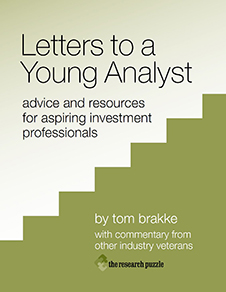
- Sunday, November 18th, 2012
- talk about focus
-
In the opening posting of this series on equity research,the research puzzle | This index of the postings in the series is updated as they appear. I wrote about the rapidly evolving environment for research ideas. A part of the new dynamic is the presence of investment professionals online who explain their ideas and reveal their positions.
A great recent example of this is John Hempton’s writing on Focus Media Holding (FMCN). Hempton is the chief investment officer for Bronte Capital, a small firm based in Australia. An affiliate is registered in the United States, so you can read its Form ADV, Part 2 to find out more about it.SEC | This is the latest filing, as of August 2012. The link may no longer work once a subsequent filing is made. Bronte is short FMCN.
On its own, that fact skews the assessment of Hempton and Bronte. There are many investors who equate short sellers with nefarious activities, convinced that they are a blight on the capital markets.
I am not in that camp. First of all, it is a legal activity. But, more importantly, in my three decades in this business I have seen many more trading abuses by long investors than shorts — and much more promotion of stocks from a bullish stance than a bearish one. Investors are fleeced on a regular basis by managements, analysts, newsletter writers, and bloggers hyping stocks. Action going the other way is really quite rare in comparison.
Hempton has written nineteen postings on FMCN (which appeared on his blog, also “Bronte Capital”Bronte Capital | This is the most recent posting. It contains a link to the previous one, which in turn has links to all the others.), seventeen in a flurry a couple of months ago and two recently. They concern a proposed transaction in which Carlyle and other investment groups would take FMCN private in the biggest such deal ever in China.
I read all of the postings and all of the comments on them, as well as some other sources on Focus Media. Hempton claims to be “obsessed” by the proposed deal; I am fascinated by it and by his work. He describes the debate over the stock as a battle between “rat-bag shorts” and a “who’s who of Asian business,” with the latter destined to win, resulting in a “done deal.” But.
In his postings, Hempton starts to pick away at unusual items and incongruities, all the while acknowledging possible explanations and ways in which his theories could be wrong. In fact, one great aspect of the writings is his exposition of multiple interpretations of what appears on the record, both supportive of his case and not. That is unusual in the world of analysis, where drawing a conclusion is prized and envisioning outcomes — actually the more important activity — is generally not.
The FMCN story as told by Hempton includes questions about the reasonableness of the firm’s operating metrics, its huge writedowns, and its transactions involving subsidiaries bought and then given back (with oddly matching values and suspicious connections between the sellers/recipients). Has the firm been booking fake profits and taking periodic writedowns to offset them? Is it being looted? Is it a pawn in a game of Chinese corruption? Or did those things occur and FMCN subsequently went “legit”? Or none of the above?
I don’t know. Hempton thinks there is enough uncertainty to put on a short that amounts to an asymmetric bet. If the deal goes through, there’s modest upside in the stock (a loss for Bronte), but if it doesn’t and anything looks fishy about the company, the stock could collapse, generating a nice percentage profit. (Given Bronte’s stated methodology, FMCN is likely around a one percent short in a portfolio dominated by long positions in large cap value stocks.)
For my purposes here, whether Hempton’s suspicions prove to be correct is almost beside the point. To read his posts is to witness the due diligence process as it ought to be. Digging, asking questions, digging some more, cycling back around, finding obscure information, and considering the possibilities in favor of or opposed to a thesis.
The comments on the blog postings are interesting both in content and what they represent regarding new ways of open collaboration on serious investment topics. By and large, there are very few of the garbage comments that clutter so many finance sites. Instead, you see a reasonable dialog, with some mediocre comments, some insightful ones, and some real nuggets of information along the way. Hempton actively seeks out opinions and alternative ideas from readers to help him in his research.
If I was still teaching MBA students about investments, I’d stop what we were doing and spend a couple of weeks on all the angles of Hempton’s postings: the company analysis, the interested parties, the research process, and the implications of new channels for information. But most of all I’d want them to witness the insatiable curiosity and intense focus that are evident in Hempton’s work.
Those are qualities that every investment professional ought to possess.
